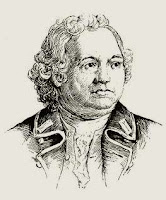“Severall other officers came to the House”
 As of 12 Mar 1776, the merchant John Rowe was writing in his diary how people in Boston were “greatly terrifyed and Alarm’d for Fear of Greater Evils when the Troops Leave.” By “the Troops” he then meant the redcoats.
As of 12 Mar 1776, the merchant John Rowe was writing in his diary how people in Boston were “greatly terrifyed and Alarm’d for Fear of Greater Evils when the Troops Leave.” By “the Troops” he then meant the redcoats.
A few days later those soldiers did leave. Continental soldiers entered Boston, Rowe started calling those men the “Troops,” and life was not evil.
In fact, Rowe was busy hosting Continental officers in his house and at his dinner table. His diary entry for Wednesday, 20 March, said:
Major [John] Chester Mr. [John] Keys & Mr. [probably Samuel Blachley] Webb paid Me a VisitRowe was welcoming a lot of Continental officers from Connecticut, probably because they had come in on the first day with Gen. Israel Putnam (shown above). Samuel Blachley Webb was that general’s aide, as well as another of Maj. Chester’s brothers-in-law.
I din’d at home with Richd. Greene Herman Brimmer Capt. [John] Skimmer Mrs. Rowe & Jack Rowe & spent the Evening at home with Capt. John Haskins Mr. Richard Greene Mrs. Rowe & Jack Rowe
They Burnt the Barracks & houses at the Cassell this Afternoon & destroyed Every thing they Could on the Island & blew up the Fortifications all around it
Herman Brimmer was a Boston merchant and shopkeeper. He was an Anglican, like Rowe, but leaned toward the Patriot side.
John Skimmer was a ship’s captain. Back in 1769 he was master of the brig Nancy, owned by Rowe, which brought goods from Bristol despite the non-importation agreement. Skimmer commanded one of the schooners sent out by Gen. George Washington during the siege. In 1778 he died while commanding a privateer.
In the last paragraph above Rowe described what the British military was doing at Castle William, but he didn’t even identify who “They” were. The king’s troops still held that fortified harbor island, but they were doing as much damage as they could so the rebels wouldn’t be able to use it to protect the town against the Royal Navy.
Rowe continued to cultivate his old friends and new contacts on 21 March:
Snow’d a Little tonight not very cold…The second Webb was probably Col. Charles Webb of Stamford, Connecticut.
I dind at home with Mr. [Ralph] Inman Mrs. [Elizabeth] Inman Mrs. Rowe & Jack Rowe & Spent the Evening at home with Major Chester Capt. [Ebenezer] Huntington Capt. Keys Mr. [Samuel] Parker Mr. [Jonathan] Warner Mrs. Rowe & Jack—
Both Mr. Webbs paid Mee a Visit this day
On Friday, 22 March, Rowe visited the Continental Army’s quartermaster general and one of his deputies, then hosted two of that army’s generals:
I went to see Colo. [Thomas] Mifflin & Mr. [John Gizzage] FraserJust one week before, on 15 March, Rowe had hosted the British general James Robertson as a dinner guest, along with other redcoat officers. Now he dined with Putnam and Greene, as well as receiving the Continental Army’s chief engineer and “Severall other officers.”
I din’d at home with General Putnam Generale [Nathanael] Greene—Mr. Inman Mrs. Inman Mrs. [Dorothy] Forbes Mrs. Rowe & Jack—
after Dinner Colo [Richard] Gridley Mr. [Thomas] Chase Both Mr. Webbs & Severall other officers came to the House
I Spent the Evening at home with Capt. [William?] Blake Mr. Richard Greene Mrs. Rowe & Jack Rowe & Capt. Gilbt. Speakman
On a more personal level, Rowe spent the evening with Gilbert Warner Speakman, a nephew. Back in 1774 Rowe had written frostily about the young man because of his political militancy out in Marlborough. Now Speakman was a captain in Col. John Glover’s victorious regiment, and he was welcome back to his uncle’s house.
TOMORROW: The last of the fleet and the big prize.

No comments:
Post a Comment